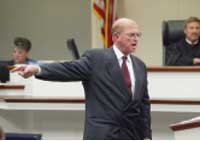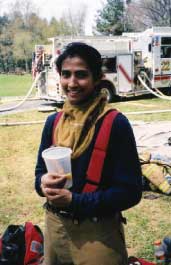

|
Fellow lawyers regularly point to his down-home manner and lilting Virginia drawl which, they assert, juries respond to in spades. Although Paul B. Ebert (business administration '59) may not present the conventional image of a prosecutor--much less a commonwealth's attorney--to which we're accustomed, colleague Ronald Bacigal, professor of law at the University of Richmond, says, "He's very businesslike. Very methodical."
His rural heritage and fondness for fishing and duck-hunting aside, Ebert, the commonwealth attorney for Prince William County, Va. (the state's third largest jurisdiction), is no country bumpkin. His aggressive prosecution has sent 13 criminals to death row--more than any other Virginia prosecutor--during his 35 years in office. (Virginia has executed 89 convicts since the U.S. Supreme Court reinstated the death penalty in 1976.)
|
Ebert prosecuted the infamous Lorena Bobbitt case and most recently mounted the state's case against Washington, D.C.-area sniper John Allen Muhammad, which resulted in a guilty verdict and a recommendation of the death penalty for the man who orchestrated the murders of 10 people in the October 2002 rampage.
When Ebert, a Democrat, was personally selected by U.S. Attorney General John Ashcroft to prosecute Muhammad, he had mixed emotions: "First, I was surprised and, secondly, honored to be selected." In the end, Ebert says that his "life has changed very little since the prosecution of John Muhammad insomuch as in this business, there is always another case waiting to be investigated and prosecuted."
So just how did this self-proclaimed "country boy" find his way into high-profile court cases? After receiving a J.D. from George Washington University and briefly working in private practice, Ebert moved to the Prince William County Commonwealth Attorney's office for more trial experience. When his boss left to run for a state Senate seat in 1968, Ebert entered the commonwealth’s attorney race and won the post at just 29 years of age.
In the decades since, besides his courtroom triumphs, Ebert founded the Prince William County Crimesolvers, established a Child Abuse Unit (for which he received commendation from the National Center for Missing and Exploited Children), and launched an Expert Witness Clearing House for the county. As the recipient of an array of prestigious awards, Ebert, who seemingly understates his accomplishments at every turn, maintains that the level of success he has enjoyed is due mostly to his staff and 17 assistant commonwealth attorneys.
Not surprisingly, Ebert's capabilities go well beyond the courtroom. "I feel that my education at Virginia Tech was excellent. To this day, my knowledge of the business world, statistics, economics, and accounting has assisted me in being able to understand and prosecute many crimes where my colleagues were lacking in a business background."
Now just how much of a country boy can this Hokie really be?
|
To protect and to serve by Kate Wichmann
|
When the first plane crashed into the World Trade Center on Sept. 11, 2001, Liezel D'Souza (M.S. computer studies '00) was working in her Capital One cubicle in Fairfax, Va. An international student from Bombay, India, D'Souza chose Virginia Tech partly because Blacksburg was rated a safe place to live. After graduation, D'Souza--who married fellow international student Are Andresen (computer engineering '99)--decided to remain in the United States.
However, it wasn't until the events of Sept. 11, says D'Souza, that she realized "how much I love this country and everything it stands for. Freedom of speech, thought, and action is invaluable." To act upon her feelings, she chose to give back to her adopted country by becoming a volunteer firefighter.
 |
"Growing up in India, I always used to look at the fire engines as they drove by and I did want to join them," she explains. "But India doesn't have a volunteer system, and opportunities for women in fire services were unheard of, and still are." After speaking with volunteer firefighters in Virginia--some of them women who share her petite build, which had been a concern--D'Souza decided to go for it.
Last January, D'Souza began five months of training, four days a week, with the Fairfax County Volunteer Fire Department, from which she graduated in May. She now spends 40 hours a month working alongside career firefighters, with duties ranging from participating in engine and ambulance crews to more light-hearted tasks, such as working at bingo games and helping with school field trips--in addition to her 9-to-5 job at Capital One.
Yet D'Souza believes that her time is well spent and that by helping citizens, saving people's lives, raising money for the fire department, and teaching children safety tips, she is giving back to America. She has also learned the value of her fellow firefighters: "They put their lives on the line every day," she says simply.
Her message to the community? "Make an attempt to get to know your local fire department, as a volunteer or not. Try to support them by volunteering your time or donating money." Remember, she adds, "these are the folks who will cut a car open to get you out, these are the folks who will crawl into your burning house to get you out, these are the folks who will be there for you when you need them--give them whatever support you can."
|
|
Liezel D'Souza '00
|
|
Auburn docs rooted in Tech tradition
|
When Tom Gallagher (M.S. forestry '84; Ph.D. '03) began playing basketball in Auburn University's Student Activities Building with fellow faculty members during their lunch break, he became, to his surprise, the sixth Virginia Tech alum to jouot;
The other Hokies--Leonard Bell (chemistry '87), Mac Cutchins (chemical engineering '56; M.S. '64; Ph.D. engineering mechanics '67), Joe Eakes (Ph.D. horticulture '89), Charles Gilliam (M.S. horticulture '76; Ph.D. '77), and Steve Merryman (electrical engineering '87)--only recently realized the extent of their Tech connections. And with the arrival of new Provost Thomas Hanley (chemical engineering '67; M.S. '71; Ph.D. '75), there are now seven "doctors" at Auburn who played basketball in Tech's War Memorial Gym as students over the past six decades.
Playing basketball, Cutchins recalls, helped him accomplish more as a student. "Current health research is verifying what I learned years ago--that you get more done on your work by taking a break from it and getting some exercise and stress relief," he explains. "You can’t play a round of golf at lunch, but you can work in three 24-point games of vigorous play up and down the court."
Cutchins estimates that he has played more than 12,000 full-court games which, he says, are "quite competitive." He adds that the games he plays these days are a "great way to meet and get to know other faculty," and Auburn faculty members from several dozen different departments have made friendships on the court over the years.
Instead of The Lunch Bunch’s practice of rotating teams, Cutchins hopes that he and four other Tech alums will some day form a permanent team. He believes that their cumulative experience rooted in their student days could make for a winning combination: "The baskets are the same height and size as those in ol' War Memorial Gym, you know."
|